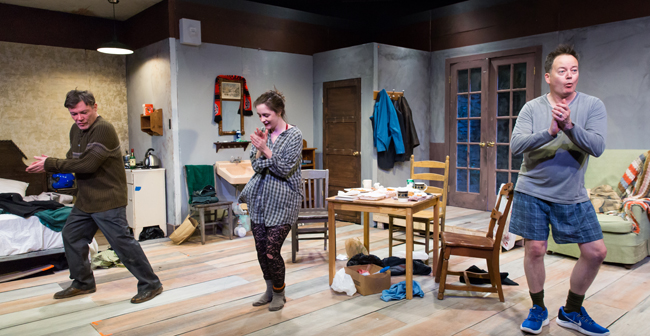Culture
 Photo: Jae Yi Photography
Photo: Jae Yi Photography
Scena Theatre’s ‘The Night Alive’
March 22, 2017 @ 12:00am
When I walked into the Lab II at Atlas Performing Arts Center to view The Night Alive by Irish playwright Conor McPherson, I was immediately transported to a place of grunge. The stage was littered in dirty clothes, stripped wallpaper hanging from its foundation, and the lighting was reminiscent of a seedy pub in the middle of nowhere – a place you wouldn’t want to venture alone. We were in Dublin, present day, across from the notorious Phoenix Park.
The play, directed by Robert McNamara, opens with Tommy (played by Irish actor Barry McEvoy) and Aimee (Mollie Goff), a prostitute whom Tommy rescued after finding her beaten in the street. We’re then fumbling through the flat and tending to Aimee’s nearly broken nose, which we later discover was the product of abuse from her ex-boyfriend. I then noticed McEvoy’s comedic timing, as well as his ability to truly listen and react to Aimee and his surroundings. Actors are often concerned with getting their lines out. McEvoy wasn’t afraid of silence. I was intrigued.
Goff’s performance from the get-go was harsh and forceful. One could only assume her character’s upbringing was less than joyful; she wore a permanent face of disgust. Though confusing at times in context, it fit into the overall dinginess that the show was tinged with throughout. We eventually discover that Tommy is a divorced and detached father of two who has lost his business and is barely scraping by. Aimee is a wanderer, bouncing from man to man, and collecting cash after nights with suitors.
Tommy’s uncle-turned-landlord, Maurice (played by Ron Litman), who lives upstairs, enters the flat and begins harassing Tommy about Aimee, similar to how a father would a son. He sports a cane and a limp, which he later uses to his comedic advantage as he raids the room in a drunken stupor. Litman does a wonderful job of portraying the overbearing, but loving, father figure. He commits to his physicality and had wonderful stage presence, and I enjoyed watching his performance ranging from the disapproving money collector to the sincere and gentle caregiver reminiscing about years past.
My favorite performance of the evening was Brian Mallon, who played Doc, Tommy’s older sidekick, freelance coworker and friend. At the top of the show, Doc was set up to be dimwitted, which was later proved false as he spewed out random facts throughout the play. Mallon’s portrayal of Doc was beautiful in every sense of the word. His innocence was tangible, and the subtle nuances of his performance, from the way he pushed the hair out of his eyes to the way he simply delivered the line “I don’t know” when asked a question, was breathtaking. Mallon stole the show. He teetered between comical and heartbreaking; witnessing such a pure performance from an acclaimed Irish actor was a treat.
Robert Sheire rounds out the cast as Kenneth, the abusive and maniacal ex-boyfriend. I’d like to give kudos to Sheire for committing to such an outlandish character and for sporting vampire teeth for a brief moment in the show. It was very Kiefer Sutherland-esque.
“May lost souls find salvation,” the play’s tagline, kept ringing in my mind throughout the production. Every character you met was battling with their own sadness; despair so heavy that it could derail them at any given moment. All I wanted in the end was for everyone to be okay. For Aimee to get herself together, for Maurice to properly grieve his late wife, for Doc to stand on his own two feet and for Tommy to regain control of his life.
For Tommy, life lacked purpose, despite being a father, nephew, and provider and confidant for Doc. It wasn’t until he rescued Aimee and a friendship developed between the two that he truly felt purposeful. He is the glue that holds the play together – a guiding light and a compass. Without him, the worlds of the other characters would come crashing down.
The play concludes with the characters finding their salvation, purpose and joy; their heaven, when everything in the world just seems okay, and their desire to feel needed and wanted being fulfilled. The Night Alive is a fantastic story about what it means to be human, and the varying stages of one’s life, from birth to death and everything in between. It’s about finding yourself in the midst of chaos and discovering what makes you feel joy, whether it’s bringing your friends a dinner of fish and chips, caring for a damaged soul, or sitting outside on your new patio sipping hot whiskey.
Overall, Scena Theatre’s production of McPherson’s play was executed well. I found some of the direction to be confusing, particularly the perpetual harshness of Aimee’s character, the abrupt choices in sound design, namely during scene changes, and the odd detail, which some may not have noticed, of consuming sweet potato fries at dinner (I’m not sure lower-class Dubliners would eat this!) as opposed to your typical Ireland fare of white potatoes. However, the writing and the performances from McEvoy, Mallon and Litman are the redeeming factors, and worth every penny of admission.
The Night Alive runs at Atlas Performing Arts Center every Thursday through Sunday until April 9. Tickets are $20-$40. For more information on Scena Theatre, visit www.scenatheatre.org.
Atlas Performing Arts: 1333 H St. NE, DC; 202-399-7993; www.atlasarts.org








